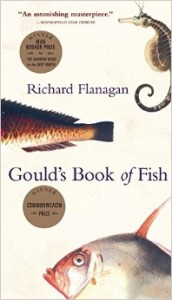This is a very enjoyable read, although it makes no sense whatsoever, which is how I often feel about reading Faulkner, someone who I believe Flanagan had in mind here, along with the poet, Rimbaud.
The story is structured roughly like Rimbaud’s Season in Hell, opening with a fairly sane, ordinary person discovering a book from the 19th century describing a journey into a hallucinogenic hell, death, and transformation. For Flanagan’s character, Hammett (later Gould), the POV slides so that Hammett, the reader of the book becomes Gould, the character narrating the found book. And in that story, what does Gould do? He writes a book, of course, (involving fish), which turns out to be, you guessed it, the very book that Hammett found in the beginning. This hall of mirrors structure accentuates the madness that envelops the characters, and contributes an extra layer of light-hearted fun.
And humor is needed in this novel to leaven the relentless emphasis on filth, squalor, torture, and human degradation. Every conceivable body product, solid, liquid, and gas, is described, expressed, and publicly displayed in detail, as are those of many animals, including rats, pigs, birds, and fish. Naked bodies, male and female, black and white, are mutilated, crushed, cannibalized, shot, beheaded, gutted, drowned, burned, skinned, and slashed. Add to this mayhem layers of fire, water, mud, slime, mold, rotten food, and insects, especially lice. A lot of lice in this book. What fun.
And that’s why the main character’s humorous, self-effacing tone is both necessary and enjoyable, as are other zany narrative voices and descriptions. That contrast is what makes the book work.
The book is highly episodic, perhaps closest to a picaresque in form. Whatever story throughline is present is obscured by nearly all of the characters being barking mad. The reader is left to enjoy individual episodes for their sheer creativity and lyricism. Several times, Flanagan mentions Faulkner’s famous one-line chapter in As I Lay Dying: “My mother is a fish.” In this tall tale, the main character actually becomes a fish (why not?).
There are serious thematic points to be explored, but none is well-developed or easy to extract. They are of the kind, “When you’ve got nothing, you’ve got nothing to lose,” and “We’d all be better off as fish, without language and thought.” Perhaps the most interesting is the juxtaposition of reality, fictional reality, and fantasy. And I should mention that in the trade edition anyway, the illustrations (of fish) are quite lovely and add significant value.
Some random examples of Flanagan’s very enjoyable language and style:
“It is difficult, looking back on it, to believe that Billy Gould could be privileged to know so much flesh & still remain unmoved. I would not insult Mrs Gottliebsen who was in so many ways a nice woman & most attractive, apart from her face, but then who looks at the mantelpiece when they are stoking the fire? Except I couldn’t have lit a candle, far less got a fire up & racing” (p. 169).
“Even by the ugly standards of that ugly island, Jorgen Jorgensen – in spite of his affectations – was a miserable looking piece of pelican shit, all elongated & sharp angles, a coat hanger of a body trying to remember the coat that years before had fallen off.” (p. 146).
“I care not to paint pretend pictures of long views which blur the particular & insult the living, those landscapes so beloved of the Pobjoys, those landscapes that trash the truth as they reach ever upwards into the sky, as though we only know somewhere or somebody from a distance…while the truth is never far away but up close in the dirt, in the vile details of slime & scale & filth along with the Devil, along with the angels & all snared within the earth and us, all embodied in a single pulse of a heart…” (p. 93).
Flanagan, Richard (2001). Gould’s Book of Fish. New York: Grove (404 pp).

